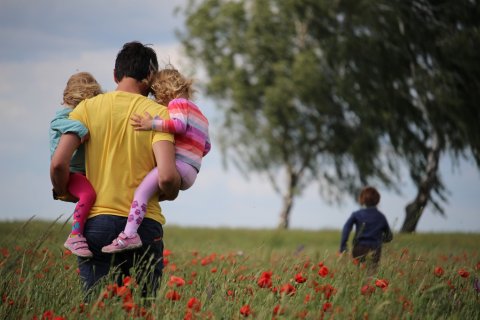“We are interested both in divorces that were resolved harmoniously and in divorces with more conflict involved.”
Zoë Rejaän on ‘Where do I belong?’
Zoë Rejaän MSc is employed as a junior researcher within the Department of Youth & Family at the Faculty of Social and Behavioural Sciences. As a Master's student, she delved into the subject of children and divorce. “I also aim to search for characteristics and factors that result in a positive outcome for parents and children.”

Zoë and Utrecht University have a history together: she completed her Bachelor's degree in Pedagogical Sciences here, going on to do a Master's in Clinical Child & Family Studies. In her studies, she paid particular attention to the manner in which parents raise their children together after a divorce, as well as on the relationship between the behaviour exhibited by parents in raising children and the problem behaviour of Dutch children or adolescents.
Positive outcome
“As a child of divorced parents myself”, Zoë explains, “the subject has always fascinated me. Divorce is often a news topic due to the negative consequences that children can experience as a result. I have often seen such situations myself during my studies, work placement and work.” What was her own experience? “I myself was lucky to have two warm and cooperative parents, so I experienced few problems as a result of their divorce. They inspired me not to focus only on the negative consequences of divorce, but also to search for characteristics and factors that result in a positive outcome for parents and children.”
When we engage in discussion with partners from practice, we gain a better picture of which problems families and society are facing, as well as which areas require additional research.
Partners from practice
“As a junior researcher, I try my utmost to represent the experiences of children and parents in our research as best I can”, says Zoë. By testing the instruments in the lead-up to the research as well as discussing them with children and their parents, she attempts to address their needs and to learn from their experiences as much as possible. This information is subsequently fed back to the research team.
Zoë: “By also embarking on collaborations with social organisations and partners in practice, I hope that we will manage to make a true contribution through our research. When we engage in discussion with partners from practice, we gain a better picture of which problems families and society are facing, as well as which areas require additional research.” Zoë is convinced that the social partners can also help in reaching a large and diverse target group, for instance. “We are interested both in divorces that were resolved harmoniously and in divorces with more conflict involved.”
Learning from each other
The research team brings together various areas of expertise, due to not just collaboration with partners from practice but also the composition of the team itself. These researchers include an urban geographer, a legal expert and a linguist. “My discipline often involves research into the behaviour of parents and children, so it is very interesting to see what types of hypotheses researchers from other fields form”, says Zoë.

She is particularly intrigued by the 'socio-geographical findings'. “My previously concept of 'belonging' mainly entailed a related feeling rather than a geographical location. I am very interested to find out about the connection between these aspects, particularly in cases where children grow up in two different homes and neighbourhoods.” Within the interdisciplinary team, Zoë primarily plays an implementing role. “The researchers in our team have already spent quite some time determining this research and the research questions. I have been involved in the project for a few months now and we are currently nearing the end of the lead-up, the preliminary phase.” At the moment, her work primarily comprises the development, fine-tuning and testing of the research instruments, in constant consultation with the research team. During the next phase, she will be among those responsible for recruiting families, as well as collecting and processing data. “In the meantime, I will also coordinate with the research team what I require from them and what they need from me.”
Research theme youth
If you want to tackle social problems, you can best start with children. The Utrecht research theme Dynamics of Youth invests in a resilient youth. Scientists from all disciplines work together to better understand children's development. How do we help children and young people grow and prosper in our rapidly changing society?

